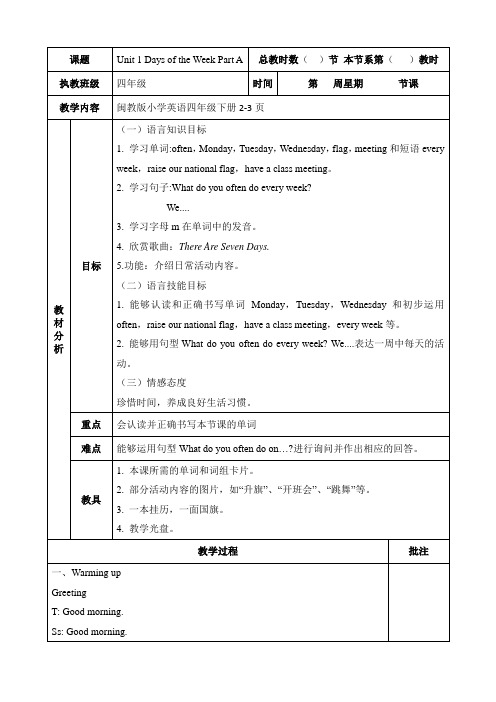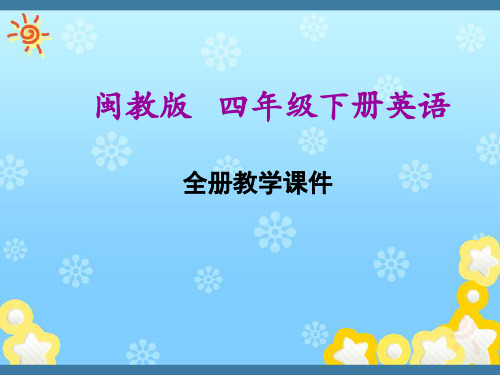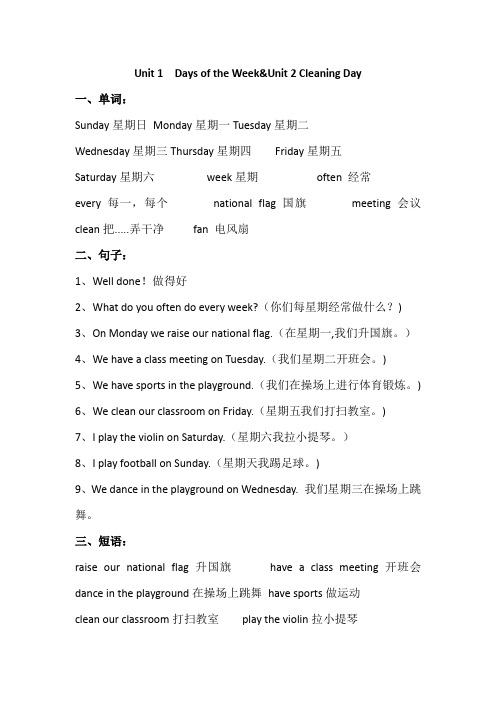闽教版四年级下册第三-四单元
闽教版(三起)小学英语四年级下册单元知识总结(全套)

Unit 1 Winter Vacation短语:the Great Wall 长城watch TV 看电视take a boat tour 划船旅行Sun Moon Lake 日月潭play chess with 与……下棋do my homework 做我的家庭作业swim in the sea 在海里游泳句型:How was your winter vacation? It was wonderful.How about you?Were you in China? No, I wasn’t.How was the weather there? It was hot!动词过去式:is/am —was are —wereeat —ate go —wentsee —saw visit —visitedwatch —watched play —playeddo —did take —tookrun —ran come —cameget —got want —wantedswim —swam give —game语法(一般过去时):(1)规则动词过去式的构成有四条规则:①一般在动词原形末尾直接加上-ed。
如:look—looked,visit—visited,watch—watched。
②以不发音的字母e结尾的动词,只需加-d。
如:live—lived。
③末尾只有一个辅音字母的重读闭音节,先双写这个辅音字母,再加-ed。
如:stop—stopped。
④末尾是“辅音字母+y”结尾的动词,先改y为i,然后再加-ed。
如:study—studied。
(2)不规则动词的过去式需要记忆。
如:am/is—was,are—were,go—went,swim—swam,do/does—did, come—came,take—took,have/has—had等。
学习be动词在一般过去时中的回答:如:①Were they in the supermarket? Yes,they were./ No,they weren’t.② Was he in Beijing? Yes, he was./ No, he wasn’t.Unit 2 A Visit to the Zoo短语:over there 那儿go straight 直走have a look 看一下turn left/right 向左/右转behind the hill 在山后take a photo of 给……照相give food to the monkeys 给猴子喂食under the tree 在树下句型:Where are they?There are some elephants behind the hill.What animals did you see, children?Did you give bananas to the monkeys?Did you take any photos?语法:学习过去时did作为疑问句开头的回答:如:①Did you take any photos? Yes, I did. / Yes, I took some photos.②Did you give food to the monkeys? No, we didn’t.③What animals did you see?We saw tigers, bears and elephants.④—Did you have a good time?(你们玩得快乐吗?)—Yes,we did./ Yes,we had a good time.(是的,我们玩得很快乐。
英语新闽教版小学四年级下册全册教案

1.教师播放课本第3页的Listen and learn the English sounds.部分,学生模仿跟读单词milk,monkey,mouth和swim,教会学生认读含有字母m的单词。
m, m, m , /m/, /m/, /m/
2.呈现几个有相同发音规律的单词,如:mom,money,team等,让学生尝试读一读。
课题
Unit 1 Days of the Week Part A
总教时数()节本节系第()教时
执教班级
四年级
时间
第周星期节课
教学内容
闽教版小学英语四年级下册2-3页
教材分析
目标
(一)语言知识目标
1.学习单词:often,Monday,Tuesday,Wednesday,flag,meeting和短语every week,raise our national flag,have a class meeting。
(2)教学词组clean our classroom,出示单词卡片clean,告诉学生ea发/i:/音,由学生自主拼读出单词clean。
(三)课文巩固运用
1.教师播放课本第4页的教学光盘,学生跟读。
2.教师在黑板上出示下列单词和句子,请学生上台连线并读一读。
We have sports in the playground. Sunday
I _______________ on Wednesday.
2.请一位学生上台,由全班学生问他/她:“What do you often do on Monday?”该学生根据自己所写的内容回答问题。
3.教师请写有相同内容的所有学生起立,齐声说:“We … on Monday. We are friends.”
新闽教版四年级下册英语全册教案

新闽教版四年级下册英语全册教案Unit 1 Days of the Week文化和语言注释1.英语星期名称的由来:公元5世纪,原居北欧的盎格鲁撒克逊人为纪念他们崇拜的诸神而把一周的七天定为:星期日 Sunday(简写Sun.),Sun’s day,意为“太阳神日”;星期一 Monday(简写Mon.), Moon’s day, 意为“月亮神日”;星期二 Tuesday(简写Tue.), Tiu’s day,意为“战神日”;星期三 Wednesday(简写Wed.),Wode’s day,意为“风神日”;星期四 Thursday(简写Thu.),Thor’s day,意为“雷神日”;星期五 Friday(简写Fri.),Frigg’s day,意为“爱情女神日”;星期六 Saturday(简写Sat.),Saturn’s day,意为“土神日”。
2.Sunday在《圣经》里是一周的第一天,又是安息日(主日),这一天是基督徒敬拜主耶稣的日子。
3.一周的七天中,Friday(星期五)还有其特殊文化含义。
耶稣是在星期五被钉在十字架上的。
另一说法是,亚当、夏娃违背上帝禁令,吃了伊甸园的禁果的时间也是在星期五。
对西方人来说,星期五是个不吉利的日子,特别是星期五如果又恰逢13号,更是使人惶惶不安。
有趣的是,Friday还意为“忠实的仆人”(英国作家Defoe所著Robinson Crusoe中Crusoe的男仆的名字叫man Friday,女仆叫girl Friday)。
此外,关于星期五,还有Good Friday(圣星期五,基督教中复活节前的星期五,为纪念耶稣受难的日子)的说法。
4. What do you often do every week?(你们每星期经常做什么?)(1)often英国英语读作/Dfn/,美国英语读作/Dftn/,一般用于动词之前,如:I often play football on Sunday.(我经常在星期天踢足球。
福建教育出版社(闽教版)四年级下册小学英语全册课件PPT

星期二我们开班会。
We have a class meeting _o_n_ Tuesday.
星期三我们在操场上跳舞。 We dance in the playground _o_n_ Wednesday.
星期___你经常做什么
What do you often do on______ ?
We….
art 美术
I like art. But I’m not good at it. 我喜欢美术。但是我不擅长它。
Bus
Don’t worry. 不要担心。
I can help you. 我会帮助你。
Don’t worry. 不要担心。
I can help you. 我会帮助你。
Don’t worry. 不要担心。
clean the window Sally is cleaning the window.
clean the desk Lily is cleaning the desks.
clean the chair Yang Ming is cleaning the chair.
clean the door Wang Tao is cleaning the door.
math 数学 mouth 嘴巴
PE 体育
computer 电脑
music 音乐
arm 手臂
art 美术
music Subjectsmath
Chinese math English
CchoinmepsuetermusicEnglish computer art English
P.E. art math
A: English B: Math
Free talk
闽教版四年级英语下册全册单元知识梳理

Unit 1 Days of the Week&Unit 2 Cleaning Day一、单词:Sunday星期日Monday星期一Tuesday星期二Wednesday星期三Thursday星期四Friday星期五Saturday星期六week星期often 经常every 每一,每个national flag 国旗meeting 会议clean把.....弄干净fan 电风扇二、句子:1、Well done!做得好2、What do you often do every week?(你们每星期经常做什么?)3、On Monday we raise our national flag.(在星期一,我们升国旗。
)4、We have a class meeting on Tuesday.(我们星期二开班会。
)5、We have sports in the playground.(我们在操场上进行体育锻炼。
)6、We clean our classroom on Friday.(星期五我们打扫教室。
)7、I play the violin on Saturday.(星期六我拉小提琴。
)8、I play football on Sunday.(星期天我踢足球。
)9、We dance in the playground on Wednesday. 我们星期三在操场上跳舞。
三、短语:raise our national flag升国旗have a class meeting开班会dance in the playground在操场上跳舞have sports做运动clean our classroom打扫教室play the violin拉小提琴play football踢足球play basketball打篮球stand on a chair站在椅子上clean the blackboard擦黑板clean the desks擦桌子clean the chairs擦椅子clean the window擦窗户clean the door擦门close the door关门turn off the lights关灯turn off the fans关风扇watch TV 看电视Unit 3 School Subjects一、词汇:Chinese语文English英语math数学music音乐art美术PE体育science科学help 帮助interesting 有趣的二、句子:1.—What day is today? —It’s Monday. 今天星期几?今天星期一。
闽教版小学英语四年级下册全册教案

Unit 1 Days of the Week文化和语言注释1.英语星期名称的由来:公元5世纪,原居北欧的盎格鲁撒克逊人为纪念他们崇拜的诸神而把一周的七天定为:星期日 Sunday(简写Sun.),Sun’s day,意为“太阳神日”;星期一 Monday(简写Mon.), Moon’s day, 意为“月亮神日”;星期二 Tuesday(简写Tue.), Tiu’s day,意为“战神日”;星期三 Wednesday(简写Wed.),Wode’s day,意为“风神日”;星期四 Thursday(简写Thu.),Thor’s day,意为“雷神日”;星期五 Friday(简写Fri.),Frigg’s day,意为“爱情女神日”;星期六 Saturday(简写Sat.),Saturn’s day,意为“土神日”。
2.Sunday在《圣经》里是一周的第一天,又是安息日(主日),这一天是基督徒敬拜主耶稣的日子。
3.一周的七天中,Friday(星期五)还有其特殊文化含义。
耶稣是在星期五被钉在十字架上的。
另一说法是,亚当、夏娃违背上帝禁令,吃了伊甸园的禁果的时间也是在星期五。
对西方人来说,星期五是个不吉利的日子,特别是星期五如果又恰逢13号,更是使人惶惶不安。
有趣的是,Friday还意为“忠实的仆人”(英国作家Defoe所著Robinson Crusoe中Crusoe的男仆的名字叫man Friday,女仆叫girl Friday)。
此外,关于星期五,还有Good Friday(圣星期五,基督教中复活节前的星期五,为纪念耶稣受难的日子)的说法。
4. What do you often do every week?(你们每星期经常做什么?)(1)often英国英语读作/Dfn/,美国英语读作/Dftn/,一般用于动词之前,如:I often play football on Sunday.(我经常在星期天踢足球。
四年级英语下册Unit3PartA教案(新版)闽教版

四年级英语下册Unit3PartA教案(新版)闽教版Unit 3 School Subjects文化和语言注释1.What day is today?(今天星期几?)It’s Wednesday.(星期三。
)What day is today?中的day指的是星期几,不指日期。
询问几月几号用的句子是:What’s the date today?(今天是几月几号?)2.We have a math class this morning.(我们今天上午有一节数学课。
)(1)math(数学)是美国英语,maths是英国英语,都是学科的名称mathematics(数学)的缩写形式,是不可数名词。
(2)“今天上午”英语是:this morning,不能用today morning。
“在上午”英语是:in the morning,但是在this morning之前不能加in。
(3)类似的表达法还有:this afternoon(今天下午),this evening(今天晚上)。
但是不讲this night,而用tonight(今天晚上)。
3.We have an English class,too.(我们上午也有一节英语课。
)I like it.But I’m not good at it.(我喜欢英语,但是我英语学得不好。
)(1)English可以解释为“英语”、“英国人”、“英国的”,如:Do you like English?(你喜欢英语吗?)Are they English?(他们是英国人吗?)English history is very interesting.(英国历史非常有趣。
)(2)be good at...(擅长……)后接名词、代词或动名词,如:He is good at math,but I’m not good at it.(他数学学得很好,但我学得不好。
) Wang Tao is good at running.(王涛擅长跑步。
闽教版(三起)小学英语四年级下册单元知识总结(全套)

Unit 1 Winter Vacation短语:the Great Wall 长城watch TV 看电视take a boat tour 划船旅行Sun Moon Lake 日月潭play chess with 与……下棋do my homework 做我的家庭作业swim in the sea 在海里游泳句型:How was your winter vacation? It was wonderful.How about you?Were you in China? No, I wasn’t.How was the weather there? It was hot!动词过去式:is/am —was are —wereeat —ate go —wentsee —saw visit —visitedwatch —watched play —playeddo —did take —tookrun —ran come —cameget —got want —wantedswim —swam give —game语法(一般过去时):(1)规则动词过去式的构成有四条规则:①一般在动词原形末尾直接加上-ed。
如:look—looked,visit—visited,watch—watched。
②以不发音的字母e结尾的动词,只需加-d。
如:live—lived。
③末尾只有一个辅音字母的重读闭音节,先双写这个辅音字母,再加-ed。
如:stop—stopped。
④末尾是“辅音字母+y”结尾的动词,先改y为i,然后再加-ed。
如:study—studied。
(2)不规则动词的过去式需要记忆。
如:am/is—was,are—were,go—went,swim—swam,do/does—did, come—came,take—took,have/has—had等。
学习be动词在一般过去时中的回答:如:①Were they in the supermarket? Yes,they were./ No,they weren’t.② Was he in Beijing? Yes, he was./ No, he wasn’t.Unit 2 A Visit to the Zoo短语:over there 那儿go straight 直走have a look 看一下turn left/right 向左/右转behind the hill 在山后take a photo of 给……照相give food to the monkeys 给猴子喂食under the tree 在树下句型:Where are they?There are some elephants behind the hill.What animals did you see, children?Did you give bananas to the monkeys?Did you take any photos?语法:学习过去时did作为疑问句开头的回答:如:①Did you take any photos? Yes, I did. / Yes, I took some photos.②Did you give food to the monkeys? No, we didn’t.③What animals did you see?We saw tigers, bears and elephants.④—Did you have a good time?(你们玩得快乐吗?)—Yes,we did./ Yes,we had a good time.(是的,我们玩得很快乐。
- 1、下载文档前请自行甄别文档内容的完整性,平台不提供额外的编辑、内容补充、找答案等附加服务。
- 2、"仅部分预览"的文档,不可在线预览部分如存在完整性等问题,可反馈申请退款(可完整预览的文档不适用该条件!)。
- 3、如文档侵犯您的权益,请联系客服反馈,我们会尽快为您处理(人工客服工作时间:9:00-18:30)。
We have an English class ,too . I like it . But I’m not good at it . Don’t worry . I can help you . It’s very nice of you .
• What day is today ? • It’s +星期几。 • We have +课程 class this morning .
乘坐小轿车 工作 步行 姑姑,阿姨,舅母 飞机 轮船 地方 火车
How do you go to school ,Sally ? By car. How do you go to school ? By school bus .
How does kate go to school ? She goes to school on foot. How does your mother go to work? She goes to work by bike .
பைடு நூலகம்
• by car 乘坐汽车 • by school bus 乘坐校车 • On foot 步行 • by bike 骑自行车 • by ship 坐船 • by train 坐火车 • by plane 坐飞机
乘坐 汽车
坐飞机
坐公交车
步行
Who’s she ? She’s my aunt . She’s from Taiwan . Does she go to Taiwan by plane ? No ,she doesn’t . She goes by ship . Taiwan is a beautiful place . Yes,it is .
数学 英语 担心 音乐 语文 PE 体育 science 科学 有趣的
• Ms . 女士
What day is today ,Sally? It’s Wednesday . We have a math class this morning . That’s right .I like math .
I like science class . Me too .it’s very interesting . And our teacher ms.lin is very interesting ,too .
Unit4
Transportation 交通
• by car • work • on foot • aunt • plane • ship • place • train
Morning class
Monday Tuesday Thursday friday
Math
Engish Pe
Chinese
Math Music
Math
Chinese Pe
English
Math Art
Do you have a science class this morning ? No ,I don’t . May I use your science book ?(可以借下你的科学书吗) Sure .here you are . (当然可以。给你) Thank you .
闽教版四年级下册英语
Unit 3 School subjects Unit 4 Transportation
Unit 3
School subjects
学校科目
• • • • • • • •
math Engish worry music Chinese art 美术 help 帮助 interesting
